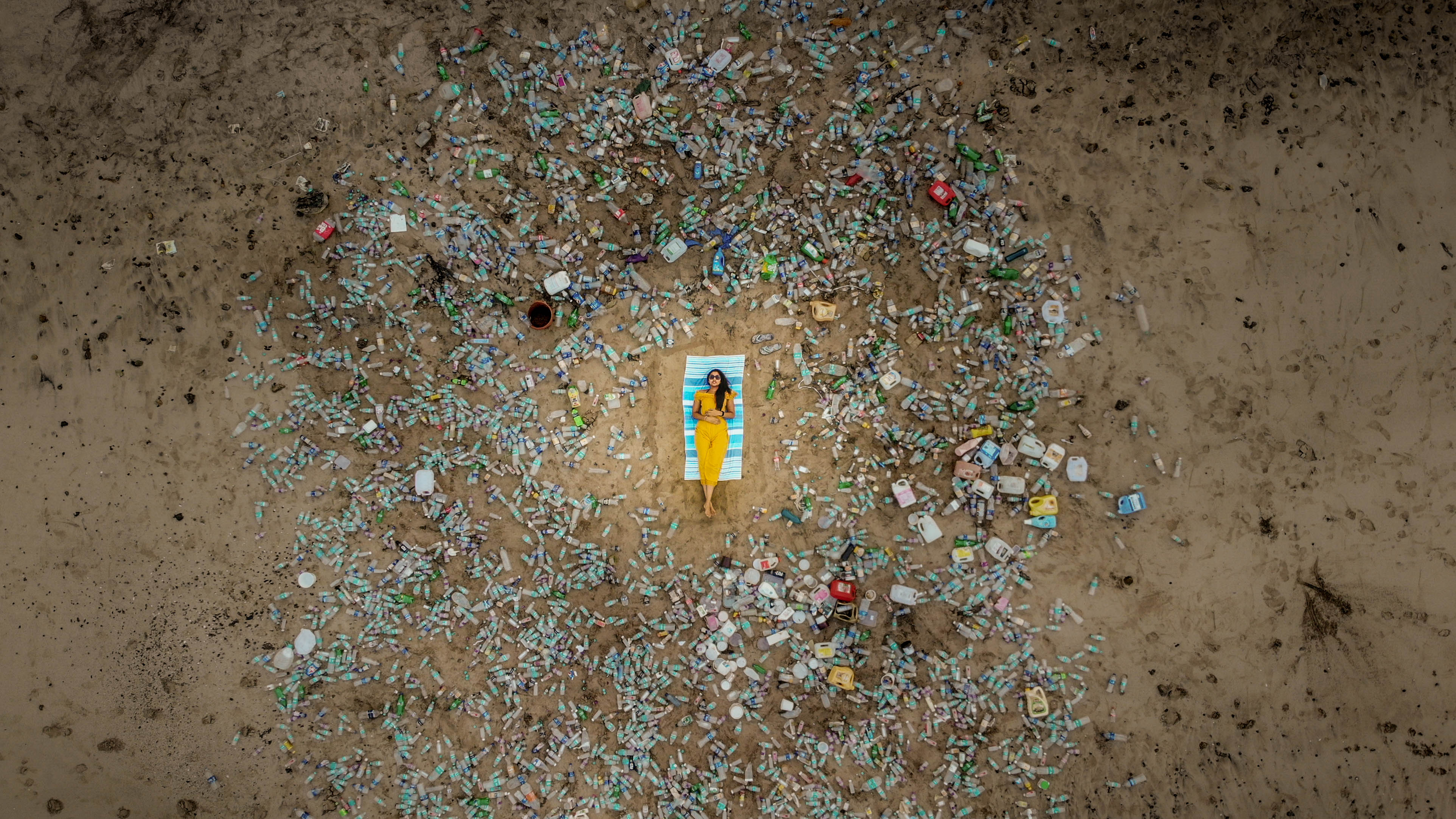Going #PlasticNeutral with rePurpose

rePurpose is a social enterprise reducing plastic from the ecosystem while directly impacting the life of the stakeholders languishing at the margins. All with the click of a button
We are drowning in an ocean of plastic.
Statistics are damning. By 2015, 8.3 billion metric tonnes of plastic had been produced. Two-thirds of it remains languishing on earth. At least 2 billion people globally do not have their rubbish collected. Heck, microplastic has reached the depths of the Mariana Trench.
Every time I shop online, I’m struck at the enormity of useless packaging that comes with the delivery. But, what if for every transaction involving plastic, you could offset its impact by recycling the equivalent of plastic you consume? That’s exactly what Peter Wang Hjemdahl, Svanika Balasubramanian, and Aditya Siroya, the three co-founders of rePurpose,a social enterprise that helps you offset your plastic footprint, intend to do.

Peter Wang Hjemdahl, Svanika Balasubramanian, and Aditya Siroya, the brains behind rePurpose
I’ve heard about carbon offsets, so naturally I’m intrigued about going #PlasticNeutral. Whether you’re an individual or an organisation, using rePurpose’s specially designed plastic footprint calculator, you can calculate your average yearly consumption of plastic.
I spend around three minutes on the tool, answering questions about my passive consumption of polymer. Beverage, groceries, snacks and meals luckily aren’t my bête noire, thanks to my healthy diet. My polymer consumption in the category of health and wellness too is low. Where I’m scaling peaks is fashion, accessories and my beloved home décor category, as every purchase online comes wrapped in copious amounts of irrelevant packing material. In total, I consume around 64 kilograms of plastic per year. rePurpose has calculated the rate to offset your consumption at Rs 35 per kilogram. “It is the true cost of ethically recycling each kilogram of plastic,” says Svanika, who is also steering the social enterprise’s marketing and growth.
This ‘reBalance’ payment is routed to one of the three organisation the enterprise has partnered with: Saahas Zero Waste (Bengaluru), Aasra Welfare Association (Mumbai), and Waste Ventures India (Hyderabad). It has barely been six weeks of operations and already, a couple of 100 people have gone #PlasticNeutral. Svanika speaks to BeejLiving about why plastic waste is so close to her heart, and why we need to learn from the past to enjoy a plastic-free future.

What does slow living mean to you?
Slow living is not about pausing the daily hustle and bustle. It implies making enough time to savour our everyday experiences. Slow Living is about being present during every action, and having the energy and empathy to connect with people and the world around us. It’s a spectrum – ranging from taking a moment to sit on a park bench and feel the grass beneath our toes to saying no to fast fashion and unchecked consumerism, and choosing to find long-term value in a few meaningful products.
What attracted you to waste?
I met rePurpose’s co-founders Peter and Adi at The Wharton School. I had grown up in Oman, so waste management and kabadiwalas were not something I was familiar with. Even though Peter is of Chinese-Norwegian descent, with no background of India, he was completing his thesis on the informal recycling sector in India, as this subject really interested him. As his peer reviewer, I was intrigued, and we decided to visit India for field research. Along with Adi, we three landed in Mumbai. Over here we experienced one of the most profound moments of our life, a visit to the Deonar landfill.
Walking inside the landfill, among towering mounds of waste and garbage, we were struck by a feeling of urgency. A subsequent visit to a few rag picker colonies was heart breaking. Entire families depended on the informal waste recycling sector for their livelihoods. Their stories were shocking. The life expectancy of many rag pickers is just 30 years, because they work in such hazardous conditions. People have lost families and limbs inside landfills, chasing trucks coming to dump waste.
It was sad that not enough was being done to formalise this sector and empower these waste pickers. Without them, a lot of recycling would not be done. They’re environmental heroes, but they’re really marginalised. That’s when we decided that we would move beyond just a research thesis to launch a social enterprise that would provide solutions to make a tangible change and formalise the sector.

Starting from a digital marketplace for plastic waste to its current avatar, rePurpose’s goals have evolved. Tell us about where you feel you can make maximum impact?
We moved to India in August 2018, and since then, we have had a few pivots on the way. We did not want to dive in without understanding the waste sector. We spent three months immersed in understanding its workings. During this time, we came across three organisations doing really good work for the environment, with high socio-economic impact: Saahas Zero Waste (Bengaluru), Aasra Welfare Association (Mumbai), and Waste Ventures India (Hyderabad), and thus decided to leave the execution to the experts, while stepping in to bridge the funding gap.
We had laid down parameters to vet the companies. The first was the socio-economic criteria of giving formal livelihoods to waste pickers, helping them increase their incomes, providing health insurance and social security benefits. The second was to ensure the companies were recycling plastic ethically, implying no child labour, using state-of-the-art machinery, offering competitive wages, etc. Lastly, we wanted the companies to have the capacity to scale up their operations.
Our focus is really on depth of impact, rather than the breadth of impact. We’re really focusing on making sure that each of our partners onboard reaches to their maximum capacity before we engage with new partners, which will be either in the Philippines or Haiti.

Plastic is a generic term for polymeric material which has many different kinds for diverse uses. Which kind of plastic does rePurpose and its partners focus on?
The informal industry typically recycles high-value plastic, such as PET bottles. Our impact comes from ethically recycling low value plastic that is ignored by most players, such as MLP or multilayer plastic (such as chips and biscuit packets) and polystyrene plastic (styrofoam).
How did you arrive at Rs 35 as the cost of ethically recycling plastic waste? How does the process take place?
When we buy any plastic items or items with plastic packaging, we are only paying for its manufacturing and distribution. That’s why disposal gets managed so badly, simply because no one has ever paid for it. We worked backwards to put a price on ethical plastic waste disposal, considering the entire chain. We guarantee that for every Rs 35, we intercept one additional kilogram of ocean-bound or landfill-bound plastic and recycle it ethically instead. The biggest problem is the ecosystem, the infrastructure and the supply chain in place. We are tackling the plastic problem as an ecosystem, not in silos.
We have three steps in our process. Our aim is to help people generating plastic waste measure their footprint by helping identify unique spaces in their lifestyle where plastic is being generated. Then we help them reduce consumption to the maximum extent possible by knowledge sharing (through targeted newsletters and information sent out every fortnight). Finally, we help them offset the remaining amount. This model is applicable to both individuals and a company.

My plastic footprint calculator came to around 64 kilograms of consumption per year. How much power does an individual have to make a difference?
It’s every person’s responsibility to care for what happens with the waste they’re generating. Can you imagine, 50% of the plastic in our landfills was used only for 15 minutes or lesser! This will survive for 1,000s of years in a landfill. Apart from individuals, we also have a certification programme that certifies companies as being 100% plastic neutral. It can’t only be large enterprises that take action, it has to be you and me too. If you put 64 kilograms of plastic into the system, we guarantee that we will remove that quantity of plastic from the ecosystem with the help of your payment. We will even help you with micro offsets at a transaction level, where, adding a few rupees to your grocery bill will help you offset all the plastic in your cart. The opportunities for impact are mind-boggling. From food delivery to online shopping, from hotel stays to flight rides – we can potentially offset each of your plastic transactions.
The concept of going plastic neutral is unfamiliar. How are you educating people about the process?
Our plastic footprint calculator helps us collect data points about your plastic usage. Once you offset it, we are able to give you customised tips and tools to reduce your own unique footprint by making changes to your lifestyle. For instance, if you use a lot of plastic in a specific category, such as make up or water bottles, we can give you simple tools to make changes in your purchase habits or suggest companies that don’t use much packaging.
Every fortnight you get a newsletter with information and announcements. So, whether it is a local community beach cleanup or suggestions to reduce your plastic consumption, we keep you updated. You can also track your impact: the amount of plastic recycled and those who have benefited from your payment.

What’s next for rePurpose?
We are focusing on individuals and companies based in India, the US and Europe companies. In the United States, less than 9% of plastic in the entire country is actually recycled there. The remaining 91% is either landfilled, incinerated, or shipped off to developing countries such as Malaysia, India and Indonesia who have to deal with it. Thus, this isn’t limited to a certain geography – we have to remove plastic from the planet, wherever you are!
Apart from focusing on our partners to reach a 100% capacity, we also have an education platform for children to learn about sustainability. We are working to build an incubator with a focus on start-ups offering circular economy solutions and designing closed loop solutions, specifically in the Indian context. We’re giving them the mentorship and funding they need to accelerate growth.

Your personal plastic footprint is around 102 kilograms. What steps are you taking personally to reduce your footprint?
Working in this space I live and breathe plastic – I’m so very cognisant of this in my everyday life. But at the same time, it has been incredibly difficult to eliminate it because I travel so much. And I meet so many people like me, who want to be environmentally conscious and at the same time are struggling to do the right thing.
I started by carrying my water bottle everywhere. It has become a part of my identity. I carry my own cutlery set with me. Clothes pose a great challenge. There is no reason that fast fashion should be such a big industry. If we look back at our grandmothers, they wore quality apparel which they passed on as heirlooms. We need to revisit this model. For my part, I’ve started a clothes swap with my friends, or I visit thrift stores.
I advise people to take one step at a time, and embrace these steps as a part of your identity. One day you will wake up and realise that it’s effortless, your new normal. I think we need to let our past guide us to the future. Historically, Indian societies have been closed loop, circular economies. As plastic became more prevalent and cheaper, we moved away from our past. For solutions to guide us into the future, we need to look towards the past.


